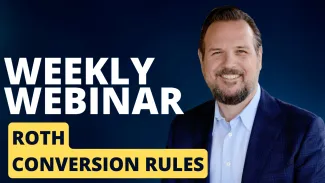
Roth Conversion Rules
Mark begins the weekly webinar by discussing IRA updates, and tax-efficient distribution updates, as well as provides commentary on how the markets performed last week and how he thinks you can best position yourself going forward. He ends the webinar with his Financial 15 where he discusses a special financial planning topic. This week, the topic is Roth Conversion Rules.
Roth Conversion Rules
When it comes to Roth conversions, there aren’t many rules. However, you have to know the rules that do exist. Ultimately, Roth conversions are a gift because they let you decide how you’re going to pay tax on the money you have pledged to the IRS. In this episode, Mark discusses the difference between a Roth IRA conversion and a contribution as well as the rules you need to know.
Conversions vs. Contributions: If we think about the three buckets of retirement savings, you have your taxable bucket, your tax deferred bucket, and you have your tax-free bucket. When you do a conversion, you take money from your tax-deferred bucket (traditional accounts) into your tax-free bucket (Roth account).
If you moved money from your taxable bucket into your Roth account, then that would be a contribution. While you’re unlimited in how much you can convert into a Roth IRA, you are limited in how much you contribute so you have to be aware of the contribution limits. Mark discusses the contribution limits you need to know for 2023.
Rules of a Roth Conversion:
- You must have an IRA. In order to do a Roth conversion, you have to have money in your tax-deferred bucket that you can convert.
- You must pay taxes on your conversion. At the time of your conversion, you’ll be given a tax bill on the money that you’re transferring into your Roth IRA. You’ll either pay this via withholding or by using the money in your taxable bucket.
- Only a traditional IRA can be converted. You can’t take money from any taxable accounts or inherited IRAs to make a Roth conversion, this money will be considered a contribution which has a different set of rules and limitations.
- Conversions must be completed by December 31st. You can contribute money to a Roth IRA up to April 15th, but all conversions must be completed in full by the end of the year.
Taxation vs Timing of Roth Conversions
Mark finishes out the Financial 15 by discussing the nuances of timing when it comes to a Roth conversion and provides tips to master the art of the conversion. Ultimately, you’re going to want to plan out your Roth conversion so that it works with your overall tax strategy rather than against it.
Each Tuesday at 10 a.m. (except Tuesdays that follow Market Holidays), I hold a Live Webinar where I discuss recent headlines, IRA and retirement planning issues from the Ed Slott Group, market updates and analyst reports, and a timely Financial Planning strategy or technique.
In this week’s webinar I discuss: Roth Conversion Rules!
Each webinar is indexed so you can jump to the section that interests you most or watch the entire broadcast.
I hope you find this webinar informative and helpful.
You can access other recordings of past Weekly Webinars and recordings of past Special Webinars on our website at https://attleborowealt.wpengine.com/weekly-webinars-82322 and https://attleborowealt.wpengine.com/webinars
Also, stay tuned for our Special Webinars that we hold throughout the year.
Please don’t hesitate to email us with any questions you have or if you’d like to schedule an appointment with us. You can reach us at questions@attleborowealth.com.
Visit our website: https://attleborowealt.wpengine.com
The opinions expressed in this program are for general informational purposes only and are not intended to provide specific advice or recommendations for any individual or on any specific security. It is only intended to provide education about the financial industry. To determine which investments may be appropriate for you, consult your financial advisor prior to investing. Any past performance discussed during this program is no guarantee of future results. Any indices referenced for comparison are unmanaged and cannot be invested into directly. As always please remember investing involves risk and possible loss of principal capital; please seek advice from a licensed professional.
Attleboro Wealth Management, LLC is a Registered Investment Adviser. This program is solely for informational purposes. Advisory services are only offered to clients or prospective clients where Attleboro Wealth Management, LLC and its representatives are properly licensed or exempt from licensure. Past performance is no guarantee of future returns. Investing involves risk and possible loss of principal capital. No advice may be rendered by Attleboro Wealth Management, LLC unless a client service agreement is in place.
—
00:00 – Introduction & Upcoming
04:29 – Market update, Slott update, Mail bag
25:07 – Financial 15: Roth Conversion Rules

